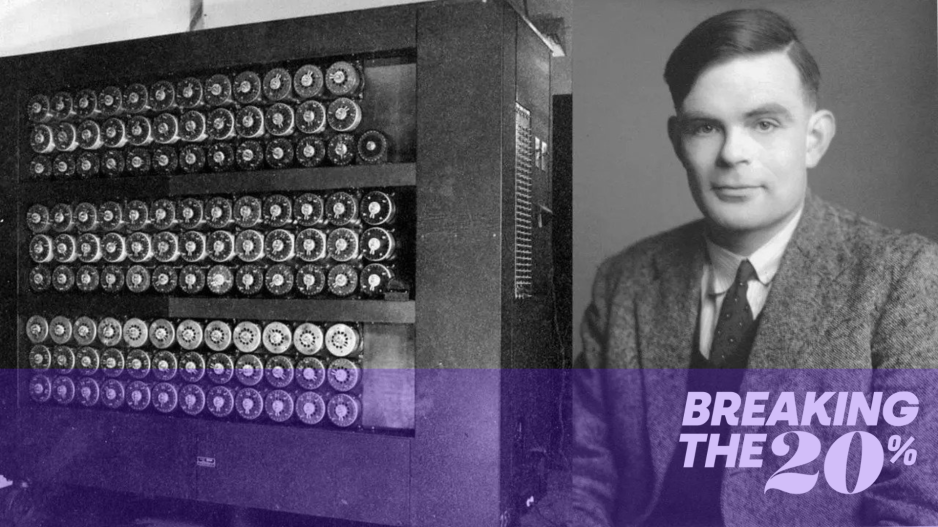Breaking the 20%: Celebrating Alan Turing
A Legacy of Genius and Resilience
As the world commemorates Pride Month, it’s a fitting time to reflect on one of the most remarkable figures in the history of computing and LGBTQ+ rights: Alan Turing. The latest episode of "Breaking the 20%" features host Elena Georgiou Strouthos and guest Jas Powell delving into Turing's life, monumental contributions to computer science, and enduring legacy.
Alan Turing was born in London in 1912 to upper-middle-class parents. His parents, stationed in India, left him under the care of a retired army colonel and his wife, which perhaps contributed to his early introspection and independence. At Sherborne School, Turing’s unkempt appearance and singular focus on science often set him apart from his peers who were more inclined towards classical studies. Despite this, he formed a significant friendship with Christopher Morcom, a fellow student who shared his scientific interests. Morcom's untimely death in 1930 profoundly impacted Turing, fueling his resolve to pursue scientific inquiry with even greater vigor.
Turing’s academic journey led him to King’s College, Cambridge, where he graduated with first-class honors in mathematics. It was here that he conceived the Turing Machine in 1936, a theoretical device that could simulate the logic of any computer algorithm. This work, a response to the Entscheidungsproblem posed by mathematician David Hilbert, laid the groundwork for modern computing.
During World War II, Turing's talents were harnessed at Bletchley Park, the British code-breaking center. He played a pivotal role in deciphering the German Enigma code, a breakthrough that significantly contributed to the Allied victory. Turing's design of the Bombe, a device used to decode Enigma messages, was instrumental in this effort. He also collaborated on the development of the Colossus, the world's first programmable digital computer, aimed at breaking the Lorenz cipher used by the German High Command.
After the war, Turing continued to break new ground in the field of computing. He designed the Automatic Computing Engine (ACE) and worked at the Victoria University of Manchester on the Manchester Mark 1, one of the earliest stored-program computers. In 1950, Turing published a seminal paper, "Computing Machinery and Intelligence," which introduced the concept of the Turing Test, a method for evaluating a machine's ability to exhibit intelligent behavior indistinguishable from that of a human.
Despite his professional achievements, Turing's personal life was marred by tragedy and injustice. In 1952, he was convicted of homosexual acts, then criminalized in the UK, and subjected to chemical castration. This inhumane treatment led to his untimely death in 1954, officially ruled a suicide but surrounded by lingering suspicions and controversy.
Alan Turing's contributions have been increasingly recognized posthumously. The Turing Award, established in 1966 by the Association for Computing Machinery (ACM), is the highest honor in computer science. In 2013, he was granted a royal pardon by Queen Elizabeth II, and Turing's Law, passed in 2017, pardoned thousands of men convicted of historical homosexual offenses.
Alan Turing’s life is a testament to the profound impact one individual can have on the world. His pioneering work in computer science and artificial intelligence continues to influence the field today. Yet, his story also serves as a poignant reminder of the social injustices faced by LGBTQ+ individuals. As we celebrate his legacy, we honor not just his scientific genius but his courage and resilience in the face of adversity.
In reflecting on Turing's life during Pride Month, we are reminded of the importance of inclusivity and the need to recognize and support the contributions of LGBTQ+ individuals in all fields. Alan Turing's story is not just a historical account but an ongoing inspiration, urging us to strive for a world where everyone can contribute their talents without fear of persecution.
Listen to the full episode here.






